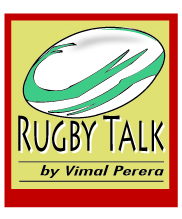Begin at the beginning – no cups and no trophies
View(s):Last week there was a series of matches played at the Thurstan College grounds and at the Royal Complex among the Under-12 and Under-13 teams. I called this a series of matches and not a tournament as this game had no cup, shield or trophies presented as such was banned by directive of the Ministry of Education. It would be right to call these organised games than a tournament.
However this is a step in the right direction as what is required is to get a feel and enjoy the game and not about winning. There were 60 teams playing in these matches. That is an indication of the popularity of the game at the junior stage.
This stage represents development of a well-rounded set of rugby skills, complimented by participation in other sports, and, for many as an ideal introductory experience. Athletes develop basic and integrated rugby skills and utilise these in game situations. The importance here is to raising the level of performance so that the higher team requirements are met. I saw this happening with most schools as there was an interest to keep to the game and not to play to win and do anything that goes to secure a win. The point that I wonder is whether some of these players have been honed properly in the skills of the game and the physical requirements.
It was somewhat disappointing to see some coaches shouting hoarse at the young brigade where in the context of young player development the approach is not right. It was equally disappointing to see players at the end of the match telling the coach ‘sir I hit him and used my hand to knock him down’.
It was disgusting to see the coaches accepting and commending the action of the players as that is the way to go. At the Under-12 game a hand-off is not permitted while a ‘fend-off’ is allowed. At games below 13, the variation merely says a hand-off or fend off is allowed. Now does that mean you decide that the hand-off as comparable when Ritchie McCaw does it and a player below 13 does it? While a hand-off may be allowed it is something the domestic gurus of rugby should put their heads together and ask if it is good for junior rugby in Sri Lanka.
“A hand-off to the face is not illegal – but that doesn’t mean the person with the ball has a license to run around the field smacking people on the nose! Hand-off is part of the game in junior rugby – but just like tackling it cannot be dangerous. This is particularly important as a big made boy, big 60kg for Under-13 is used to heave his way through much small players and keep using that hand-off effectively.
The question that individual schools authorities should ask is whether these people have the required temperament to coach the young player at this initial stage. Advisory committees in schools are a dime a dozen and it should be good if they can focus in this aspect when they look for a coach. A coach at this age group has to be a role model and the example he sets is important. The issue gets worse when coaches keep shouting from the sideline and are warned by the referee and, or sent off. Parents and old boys are at most times guilt and indirectly encourage those scalawag coaches but does not see the long term bad effect on their young children.
To drive this, the culture of age rugby requires all to sit and agree on why and how this game is to be played. It is only then that the referee could keep it simple, free-flowing and enjoyable. Let the players develop skills, with safety discouraging any dangerous action or unsafe practice and adopt an educative, positive re-enforcement approach to ensure that players receive an equal opportunity to participate, regardless of ability.
It is only is the culture of rugby being an educative process at the junior level that one could practice and adopt and encouraging and educative process rather than punitive, whistle-happy approach. When you see those coaches walking and screaming the introduction of a game to flow to help learning is a distant dream no matter how many teams are on the green.
A process should be in place to make sure that those who coach at this age group are qualified to do so. This requires the Ministry of Education, Ministry of Sports, the Sri Lanka Rugby Football Union and the Sri Lanka Schools Rugby Football Association and the referees to sit and work out a system to ensure a proper education process to be in place. There can be certificate and or diploma courses which have to be supported by the sport specific certificate issued by the governing body such as the IRB coaching certificates in the case of rugby.
Vimal Perera is a former Rugby Referee, coach and Accredited Referees Evaluator IRB


